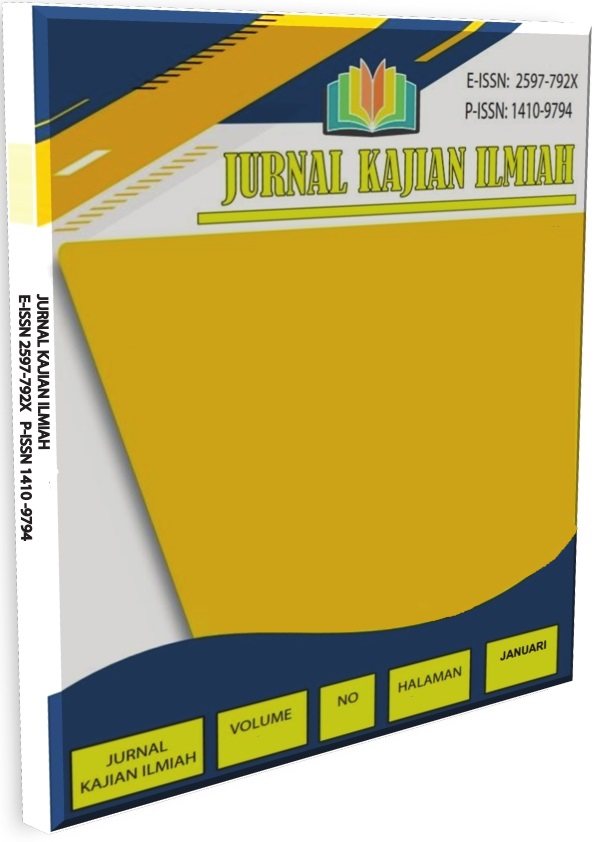Filsafat Eksistensialisme Kierkegaard Dan Implikasinya Terhadap Praktik Pendidikan Dalam Meningkatkan Spiritualitas Peserta Didik
DOI:
https://doi.org/10.31599/j9m3zp21Keywords:
Education, Existentialism, FilsafatAbstract
This article aims to explore how Kierkegaard's existentialist philosophy views and its implications for educational practices that occur in improving students' spirituality. A qualitative approach with a literature study design is used for sources with procedures for conducting studies, collecting sources, and analyzing. The results of the study indicate that existentialist philosophy directs human development at a stage that recognizes religion or religiosity. The educational implications that can be applied from this view are divided into implications for students, implications for teachers, and implications for policy managers. For students, education is a way to get to know and become themselves better. In this case, teachers need to provide freedom and encourage students to be themselves. The goals and processes of education in this case should not only be oriented towards memorization but also the process of finding identity by each student.
Downloads
References
Abdullah, I., Hudayana, B., Kutanegara, P. M., & Indiyanto, A. (2019). Beyond school reach: Character education in three schools in Yogyakarta, Indonesia. Journal of Educational and Social Research, 9.
Ashfarina, I. N., & Soedjarwo, S. (2023). Implementasi Kurikulum Merdeka Belajar di Pendidikan Anak Usia Dini (PAUD). EDUKASIA: Jurnal Pendidikan Dan Pembelajaran, 4(2), 1355-1364.
Awang, H. D., & Malelak, D. P. (2024). Filsafat Eksistensialisme Dalam Pandangan Soren Aabye Kierkegaard Terhadap Spiritualitas Pada Remaja Akhir Generasi Z. Jurnal Budi Pekerti Agama Kristen dan Katolik, 2(2), 311-323.
Bayraktar, O., & Dombayci, M. (2020). The Problem of Education between Ontology and Epistemology and Application of Kierkegaard Thought to the Problem. International Journal of Progressive Education. Retrieved from https://eric.ed.gov/?id=EJ1279334
Budiarti, A., Rahmadani, A., & Fauziati, E. (2022). Perspektif Realisme terhadap Penggunaan Metode Inquiry Learning. Elementa: Jurnal Pendidikan Guru Sekolah Dasar, 4(1).
Chaeratunnisa, E., Sari, F., & Hidayat, S. (2024). Konsepsi Filsafat Idealisme Dalam Penerapan Pembelajaran Di Sekolah Dasar. Literasi: Jurnal Ilmu Pendidikan, 15(1).
Firmansyah, A., & Jiwandono, N. R. (2022). Kecenderungan Guru dalam Menerapkan Pendekatan Student Centre Learning dan Teacher Centre Learning dalam Pembelajaran. Jurnal Guru Indonesia, 2(1), 33-39.
Friedman, R. Z. (1982). Kierkegaard: first existentialist or last Kantian? Religious Studies, 18(2), 159-170.
Gaidenko, P. P. (2005). Kierkegaard and the philosophical-esthetic sources of existentialism. Russian studies in philosophy, 43(4), 5-33.
Gultom, A. F. (2023). Albert Camus And Kierkegaard on Existential Isolation to Indonesia Citizen. Sophia Dharma: Jurnal Filsafat, Agama Hindu, Dan Masyarakat, 6(2), 43-62.
Gusteti, M. U., & Neviyarni, N. (2022). Pembelajaran berdiferensiasi pada pembelajaran matematika di kurikulum merdeka. Jurnal Lebesgue: Jurnal Ilmiah Pendidikan Matematika, Matematika Dan Statistika, 3(3), 636-646.
Hall, T. (2015). Making Kierkegaard relevant to education today. A companion to Kierkegaard. doi:https://doi.org/10.1002/9781118783795.ch33
Jaarsma, A., Kinaschuk, K., & Xing, L. (2016). Kierkegaard, despair and the possibility of education: Teaching existentialism existentially. Studies in Philosophy and Education, Springer,. doi:https://doi.org/10.1007/s11217-015-9488-x
Marzuki, M., & Hapsari, L. (2015). Pembentukan karakter siswa melalui kegiatan kepramukaan di MAN 1 Yogyakarta. Jurnal Pendidikan Karakter, 6(2).
McPherson, I. (2001). Kierkegaard as an educational thinker: communication through and across ways of being. Journal of philosophy of education.
Mozaffaripour, R., Zarghami-Hamrah, S., Mahmudnia, A., & Bagheri-No'parast, K. (2014). “Individual” in Education according to the Fundamentals of Existence Philosophy: Emphasizing Ideas by Buber and Kierkegaard. GSTF Journal on Computing (JoC), 2(4).
Nasrudin, E., & Fakhruddin, A. (2023). PENGUATAN PENDIDIKAN KARAKTER RELIGIUS MAHASISWA MELALUI PROGRAM TUTORIAL KEAGAMAAN. Waskita: Jurnal Pendidikan Nilai dan Pembangunan Karakter, 7(2), 143-158.
Nasrudin, E., Sandi, M. K., Alfian, M. I., & Fakhruddin, A. (2023). Penguatan pendidikan karakter religius melalui ekstrakurikuler keagamaan di SMA Negeri 3 Bandung. Jurnal Pendidikan Karakter, 14(1), 11-19.
Saeverot, H. (2018). Invisible Teaching: Søren Kierkegaard. International Handbook of Philosophy of Education. doi:https://doi.org/10.1007/978-3-319-72761-5_20
Shim, S. (2020). The existential meaning of death and reconsidering death education through the perspectives of Kierkegaard and Heidegger. Educational Philosophy and Theory, Taylor &Francis. doi:https://doi.org/10.1080/00131857.2020.1716334
Stewart, J. (2020). Kierkegaard: A Transitional Figure from German Idealism to Existentialism. The Palgrave Handbook of German Idealism and Existentialism, 209-240.
Thomas, J. (1953). Kierkegaard and existentialism. Scottish Journal of Theology. Retrieved from https://www.cambridge.org/core/journals/scottish-journal-of-theology/article/kierkegaard-and-existentialism/D5AE4DA9A2ADB62936D05D98263596F5
Zed, M. (2004). Metode Penelitian Kepustakaan. Yayasan Obor Indonesia.
Zulkipli, Z. (2023). IMPLIKASI PANDANGAN FILSAFAT PENDIDIKAN DALAM BIDANG PRAGMATISME. Jurnal Manajemen Pendidikan Al Hadi, 3(1), 34-47.












_-_Copy1.jpg)




